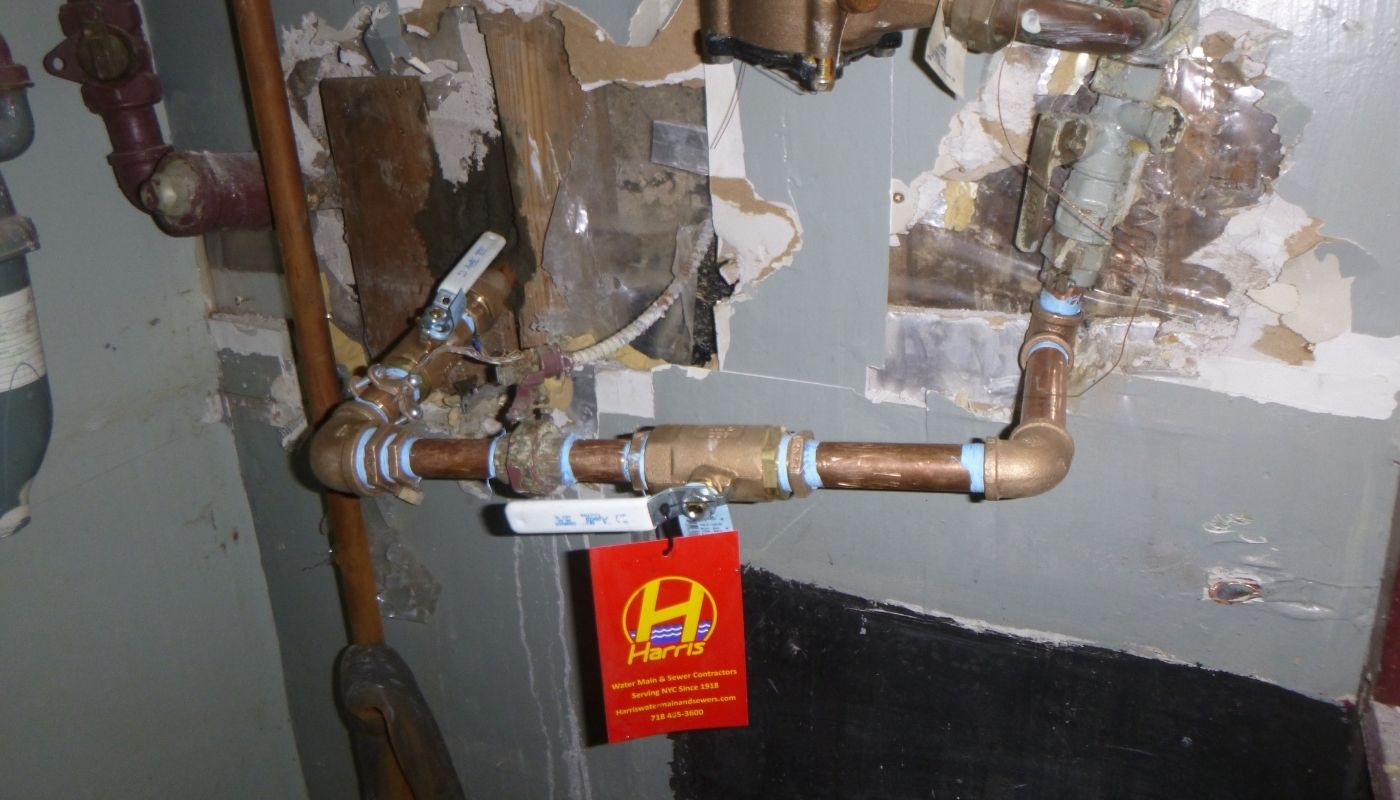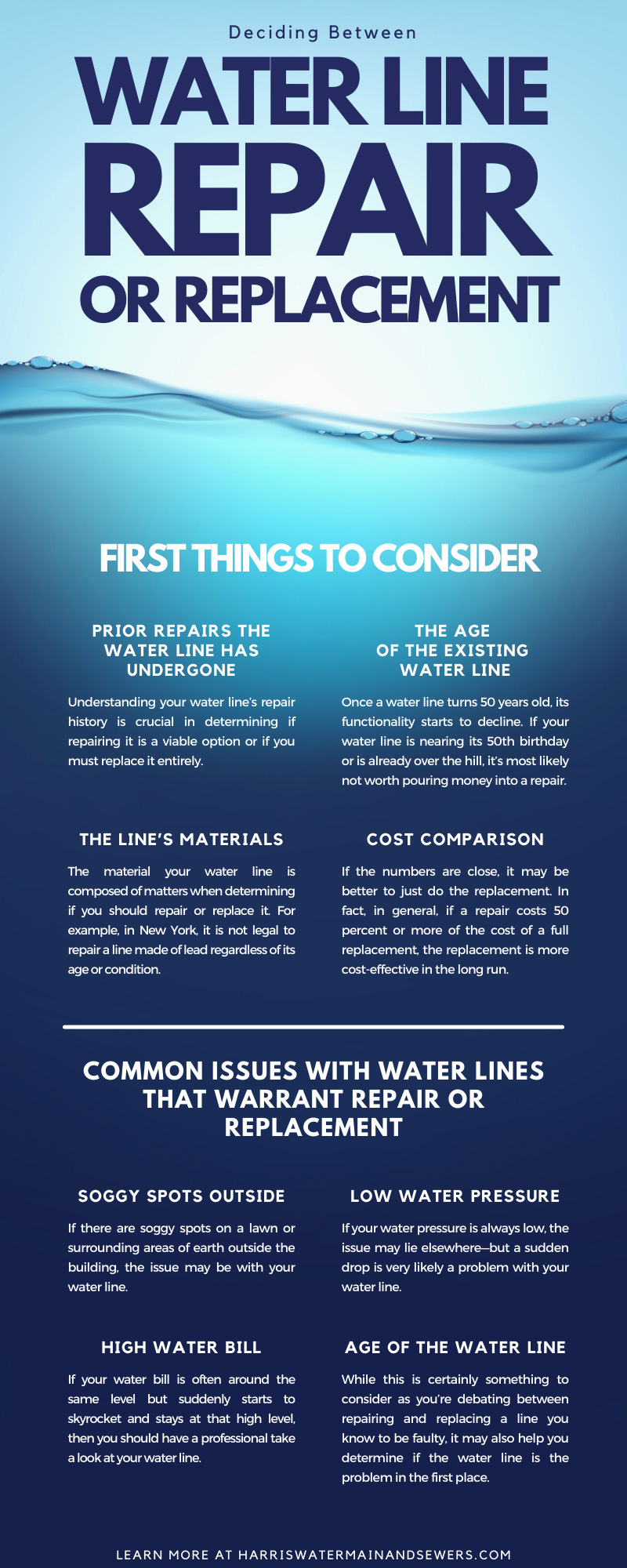Whenever a major appliance or part of the infrastructure of a building breaks or fails to work properly, there’s always a debate about whether to repair the broken part or replace the item altogether. For example, when a furnace acts up, homeowners must determine if fixing the problem is only delaying the inevitable deterioration of the furnace or will solve the issue entirely. The same debate goes for water lines with issues.
When a water line breaks or stops functioning properly, you must decide if it’s better to repair the broken part of the line or if it would be more prudent to replace the entire line. For help deciding between water line repair or replacement, check out this guide or call Harris Water Main and Sewer Contractors for more in-depth information.
First Things To Consider
Once you notice problems with your water and determine the cause to be the water line, you have a big decision to make: replace or repair? As with anything else, once you make repairs, the item is on its way out. There is much to think about when deciding this. Here are the four most important factors to consider.
Prior Repairs the Water Line Has Undergone
If a water line previously experienced issues, then there is a high likelihood it underwent repairs in the past. Understanding your water line’s repair history is crucial in determining if repairing it is a viable option or if you must replace it entirely.
A previously repaired water line is much more likely to experience further functionality issues. As a general rule, it’s typically only cost-effective to repair a water line one time. However, in some cases it may not make financial sense. It is best to have your plumbing estimator calculate the cost and weigh the pros and cons specific to the details associated with your installation. In the event of a repair, it usually becomes more fiscally responsible to replace the water line because repairs will continue to pop up.
The Age of the Existing Water Line
Once a water line turns 50 years old, its functionality starts to decline. If your water line is nearing its 50th birthday or is already over the hill, it’s most likely not worth pouring money into a repair.
Lead and galvanized pipes become more brittle over time, and if your water line is aging, it’s often only a matter of time before the line starts to deteriorate and the need for replacement is imminent anyway. If your line is about 50 years old or older, always replace it. If it’s only 25 years old, then repairing it could be a viable option—depending on other factors.
The Line’s Materials
The material your water line is composed of matters when determining if you should repair or replace it. For example, in New York, it is not legal to repair a line made of lead regardless of its age or condition. You must always replace it with newer, safer materials.
Look at the records to determine your water line’s original materials. There are currently only three legal materials in New York City for water main service lines:
- Brass
- Copper
- Ductile iron pipe
If your water line uses anything other than these three materials, it is time for a replacement.
Cost Comparison
Another important factor to reflect on is the price difference between a repair and a replacement. If the numbers are close, it may be better to just do the replacement. In fact, in general, if a repair costs 50 percent or more of the cost of a full replacement, the replacement is more cost-effective in the long run.
There is a lot more to consider than material costs when a repair or replacement occurs—material cost typically only comprises about 20 percent of the overall costs. Consequently, it’s vital to get an accurate quote for both a repair and a replacement.
Common Issues With Water Lines That Warrant Repair or Replacement
If you are concerned that your water line is damaged or no longer functioning properly, it’s best to call in professionals to confirm your suspicions. Here are some common signs that your water line needs repair or replacement.
Soggy Spots Outside
If there are soggy spots on a lawn or surrounding areas of earth outside the building, the issue may be with your water line. This problem is especially apparent during dry weather, as the excess water could not come from natural rain or wetness.
Low Water Pressure
When the water pressure suddenly drops, this is a sign that your water line may be experiencing issues. If your water pressure is always low, the issue may lie elsewhere—but a sudden drop is very likely a problem with your water line.
High Water Bill
If your water bill is often around the same level but suddenly starts to skyrocket and stays at that high level, then you should have a professional take a look at your water line. This issue will worsen over time if you don’t address it promptly.
Age of the Water Line
While this is certainly something to consider as you’re debating between repairing and replacing a line you know to be faulty, it may also help you determine if the water line is the problem in the first place. The older the water line is, the more likely it is to be a problem for you. Obtain your water line records to learn if yours is approaching the end of its lifecycle.
The first step is to determine what is causing the negative effects that you’re experiencing. Then, you must decide if it’s best to repair the issue or replace the entire line. Professionals can be instrumental in helping you choose the right option for your situation.
There are many factors to consider when you are deciding between water line repair or replacement. Let us at Harris Water Main and Sewer Contractors help you decide the best course of action for you and your water lines. Our years of experience and expertise allow us to assess and diagnose the problem easily, which saves you the headache of deciding. Contact us today for more information on water line repair or replacement and new water main installation in NYC and surrounding areas.






















